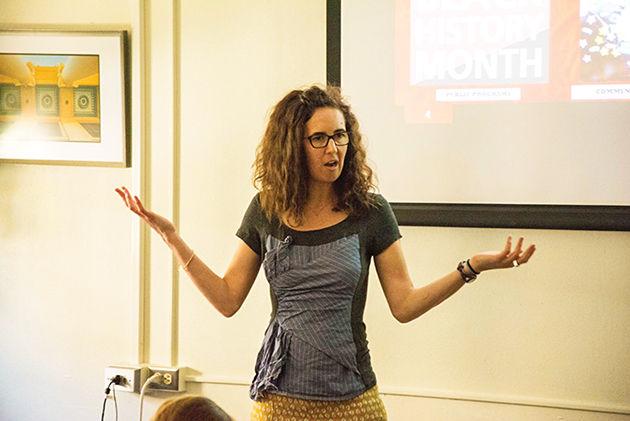Kathryn Metz, a doctor of ethnomusicology and the manager of education outreach at the Rock and Roll Hall of Fame, shared her experience in public and applied ethnomusicology in a lecture seminar Tuesday.
Since 2008, Metz has devoted her focus towards designing and teaching core curriculum using popular music to 18,000 K-12 students and adults from the Cleveland Metropolitan area, one of the poorest urban districts in the nation, Metz said.
The Rock and Roll Hall of Fame opened its doors in 1995 to serve as a home to artifacts from musicians, various exhibits and music archives. Metz began her career at the Rock and Roll Hall of Fame in 2008 after Kimberly Kattari, an A&M professor and doctor of ethnomusicology, a friend of hers, encouraged her to apply.
Metz addressed the meaning of ethnomusicology and how it can apply to society, culture, human development and non-academic frameworks. Ethnomusicology is the study of music from different cultures.
Through community outreach, knowledge of ethnomusicology and popular music Metz said she designs educational programs which promote social justice.
“In my mind, ethnomusicology is also really closely tied to social justice, because ultimately, you can trace the inequities of the world with the way music moves, who is using it, why they are using it and when,” Metz said.
Metz said ethnomusicology connects music with social justice by minimizing world inequalities.
“Ethnomusicology is connecting music with social justice, trying to straighten the inequities of the world and figuring out how we can use the power that we have to address those inequities, see what people might need and how we can help serve them. It is a very service-oriented field,” Metz said.
Metz said music can act as a medium that prompts change and social justice.
“Because we have been trying to make significant strives with improving our community policing, we were fortunate enough to host the Black Lives Matter National Conference last year,” Metz said.
To demonstrate how music can prompt social justice and change, Metz shared a video of predominantly black college students peacefully protesting on the streets of Cleveland, Ohio by chanting, “We gon’ be alright. We gon’ be alright,” the lyrics to rap artist, Kendrick Lamar’s, song, “Alright.” The students used the chorus of this popular rap song by Kendrick Lamar as a symbol of resilience, resistance and a changing dynamic within the community and culture, Metz said.
“Ethnomusicology is the study of how music reflects and affects our culture,” Kattari said.
Metz is focused on providing a safe venue, finances and resources for diverse groups of people to converge, discuss controversial issues in the community and straighten the inequities of the world.
“Let’s have the community, the people who are invested in the wellness and the well-being of the community and music talk,” Metz said.
Karina Mata-Reyes, a mathematics freshman in a music course, attended the packed lecture seminar. She said she was impacted by Metz’s presentation and the array of significant social and cultural connections that can be made by music.
“It was really interesting. I wasn’t expecting her to connect music to social issues, like Black Lives Matter and other protest that have gone on in Cleveland,” Mata-Reyes said.










